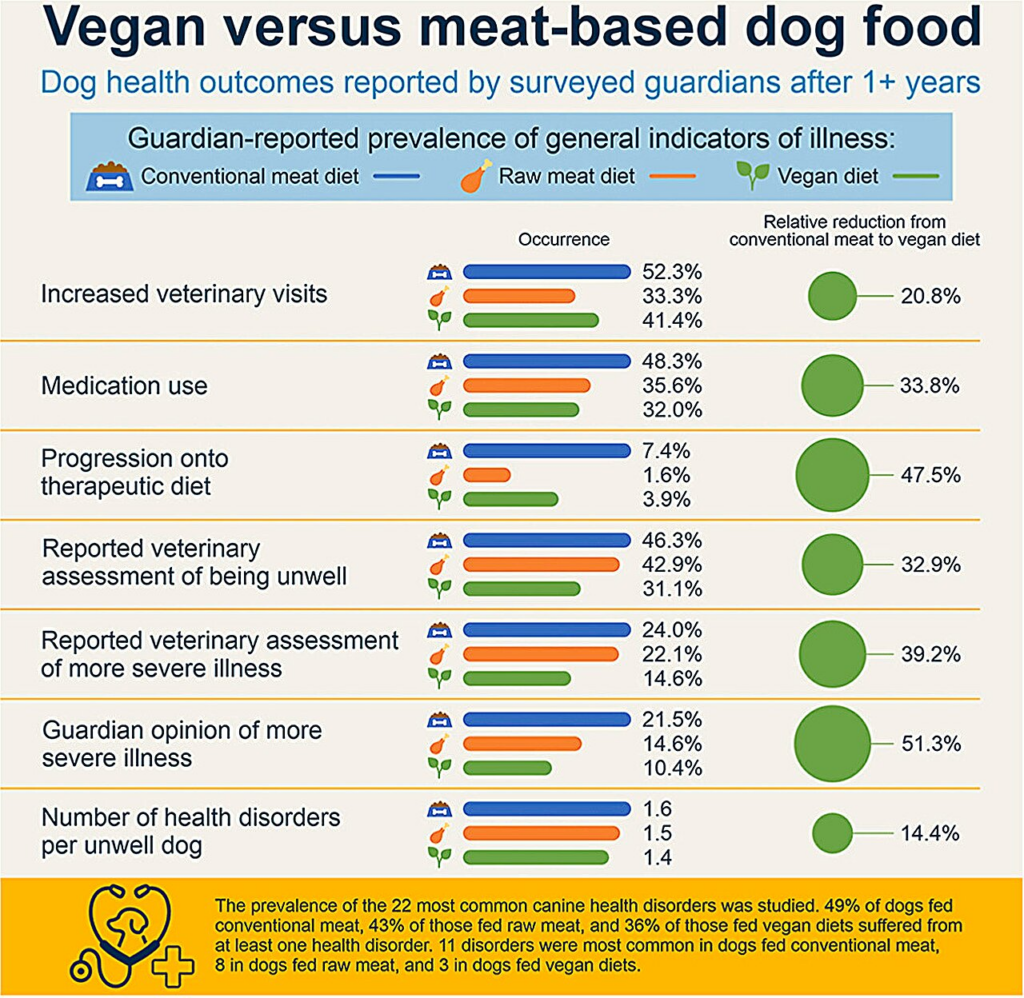Click here to sign in with or
Forget Password?
Learn more
share this!
1
Twit
Share
Email
September 9, 2024
This article has been reviewed according to Science X’s editorial process and policies. Editors have highlighted the following attributes while ensuring the content’s credibility:
fact-checked
peer-reviewed publication
trusted source
proofread
by Griffith University
Pet food consumes at least 9% of all livestock globally, rising to 20% in nations such as the U.S. with high pet ownership. The environmental benefits of vegan pet diets were recently found to be game-changingly large. Most of these relate to dog food. But can dogs be healthy without consuming meat?
Dogs are biologically omnivores, and many companies now produce vegan dog food using plant, mineral and synthetic ingredients to supply all necessary nutrients. By 2024, 10 scientific studies had demonstrated good health outcomes in dogs fed vegan or vegetarian diets, and the British Veterinary Association had endorsed nutritionally sound vegan dog diets.
Yet no studies had calculated the size of the health benefits that might occur for average dogs, after controlling for age, sex, neutering status, breed size and exercise level—all factors that can affect dog health.
Now, veterinary Professor Andrew Knight and two colleagues have published the first study to control for all of these factors. After analyzing health outcomes for 2,536 dogs, including 336 fed a vegan diet for at least one year, they found decreases in the occurrences of seven general indicators of illness.
The study, “Vegan versus meat-based dog food: Guardian-reported health outcomes in 2,536 dogs, after controlling for canine demographic factors,” has been published in Heliyon.
The researchers found that dogs fed vegan diets were less likely to need medication, medical diets or unusually high numbers of veterinary visits, were more likely to be assessed as healthy by dog owners and their veterinarians, had lower rates of illness, and fewer cases of health disorders when they were unwell. Reductions ranged from 14%–51% for average dogs, compared to dogs fed conventional meat-based diets.
All of these differences were statistically significant, meaning they almost certainly reflected true differences rather than random variation. Additionally, the odds of suffering from six specific health disorders fell by 50%–61% compared to dogs fed conventional meat. These included some of the most common health disorders in dogs: problems with body weight, ears, and the musculoskeletal and gastrointestinal system—which can cause conditions such as lameness and diarrhea.
Among the 22 most common health disorders found in a 2022 study of the same dogs, 11 were most common in dogs fed conventional meat, eight in dogs fed raw meat, and three most common in dogs fed vegan diets. Of dogs fed conventional meat, 49% were unwell, compared to 43% fed raw meat, and 36% fed vegan diets.
“Dogs fed vegan diets clearly had the best health outcomes in this very large-scale study, and these results are consistent with prior studies in this field,” Professor Knight said.
“Nutritionally sound vegan diets offer extremely large environmental benefits, so this is very good news for dog owners who want to protect the environment while also maximizing their dogs’ health. However, care should always be taken to ensure diets are nutritionally sound, by checking package labeling and purchasing from reputable pet food companies.”
More information: Andrew Knight et al, Vegan versus meat-based dog food: Guardian-reported health outcomes in 2,536 dogs, after controlling for canine demographic factors, Heliyon (2024). DOI: 10.1016/j.heliyon.2024.e35578
Journal information: Heliyon
Journal information: Heliyon
Provided by Griffith University
Explore further
Facebook
Twitter
Email
Feedback to editors
1 hour ago
0
2 hours ago
0
22 hours ago
0
Dec 27, 2024
0
Dec 27, 2024
0
1 hour ago
2 hours ago
22 hours ago
23 hours ago
23 hours ago
23 hours ago
Dec 27, 2024
Dec 27, 2024
Dec 27, 2024
Dec 27, 2024
4 hours ago
4 hours ago
Dec 22, 2024
Dec 21, 2024
Dec 18, 2024
Dec 13, 2024
More from Biology and Medical
Apr 13, 2022
Sep 13, 2023
May 15, 2024
Oct 4, 2023
Mar 19, 2019
Mar 27, 2023
Dec 23, 2024
Dec 19, 2024
Dec 17, 2024
Dec 12, 2024
Dec 12, 2024
Dec 9, 2024
Use this form if you have come across a typo, inaccuracy or would like to send an edit request for the content on this page. For general inquiries, please use our contact form. For general feedback, use the public comments section below (please adhere to guidelines).
Please select the most appropriate category to facilitate processing of your request
Thank you for taking time to provide your feedback to the editors.
Your feedback is important to us. However, we do not guarantee individual replies due to the high volume of messages.
Your email address is used only to let the recipient know who sent the email. Neither your address nor the recipient’s address will be used for any other purpose. The information you enter will appear in your e-mail message and is not retained by Phys.org in any form.
Get weekly and/or daily updates delivered to your inbox. You can unsubscribe at any time and we’ll never share your details to third parties.
More information Privacy policy
We keep our content available to everyone. Consider supporting Science X’s mission by getting a premium account.
Medical research advances and health news
The latest engineering, electronics and technology advances
The most comprehensive sci-tech news coverage on the web

